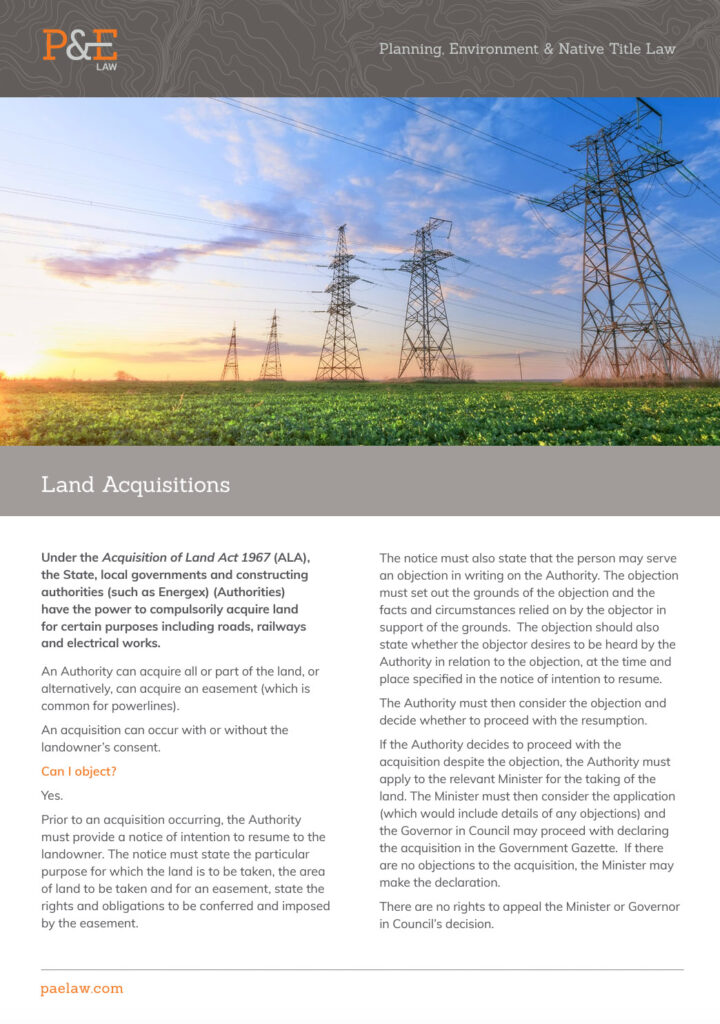
The basics of the land acquisition process
What are your rights to object to land resumed for roads, railways and electrical works?
What compensation are you entitled for land acquisitions?
This article explains the basics of the land acquisition process. [May 2023]
Land Acquisitions
Under the Acquisition of Land Act 1967 (ALA), the State, local governments and constructing authorities (such as Energex) (Authorities) have the power to compulsorily acquire land for certain purposes including roads, railways and electrical works.
An Authority can acquire all or part of the land, or alternatively, can acquire an easement (which is common for powerlines).
An acquisition can occur with or without the landowner’s consent.
Can I object?
Yes.
Prior to an acquisition occurring, the Authority must provide a notice of intention to resume to the landowner. The notice must state the particular purpose for which the land is to be taken, the area of land to be taken and for an easement, state the rights and obligations to be conferred and imposed by the easement.
The notice must also state that the person may serve an objection in writing on the Authority. The objection must set out the grounds of the objection and the facts and circumstances relied on by the objector in support of the grounds. The objection should also state whether the objector desires to be heard by the Authority in relation to the objection, at the time and place specified in the notice of intention to resume.
The Authority must then consider the objection and decide whether to proceed with the resumption.
If the Authority decides to proceed with the acquisition despite the objection, the Authority must apply to the relevant Minister for the taking of the land. The Minister must then consider the application (which would include details of any objections) and the Governor in Council may proceed with declaring the acquisition in the Government Gazette. If there are no objections to the acquisition, the Minister may make the declaration.
There are no rights to appeal the Minister or Governor in Council’s decision.
A landowner can ask the Supreme Court to judicially review a decision on the basis that the rules and procedures in the Acquisition of Land Act 1967 (Qld) have not been strictly and fairly applied or that natural justice was not afforded.
Am I entitled to compensation?
If your land is acquired under the ALA, you are entitled to compensation.
A claim for compensation must be lodged within 3 years from the date the land was taken.
Compensation will include the value of the land taken, any damage arising from the severing of land (if only part of the land is taken), injurious affection and costs attributable to disturbance, which includes legal, valuation and accounting costs, stamp duty, relocation costs and other economic losses and costs reasonably incurred as a direct and natural consequence of the taking.
If the parties cannot agree on compensation, the issue can be determined by the Land Court.
Advance against Compensation
After making a claim for compensation, a landowner can apply for an advance. The advance cannot be more than an offer of compensation made by the constructing authority or its estimate of the entitlement to compensation.
My land is being resumed – What should I do?
If you receive a notice of intention to resume, we recommend seeking legal advice in relation to:
- Any rights to object; and/or
- The preparation of a compensation claim and compensation negotiations.
It is usually appropriate to seek valuation advice to assist with the preparation of a compensation claim.
Where the Authority is taking land by way of easement, we also recommend seeking legal advice in relation to the terms of the easement. It may be appropriate to negotiate site specific terms and conditions relating to issues like biosecurity, insurance, construction requirements, rehabilitation and the use the easement area for certain purposes by the landowner.
Summary of Land Acquisition Process
- Notice of the proposed acquisition (either though a notice of intention to resume or by way of draft acquisition agreement)
- Objection process a. Lodgement of objections b. Consideration of objects by Authority
- Application to the Minister for approval for the taking of the land
- Publication of a Taking of Land Notice in the Government Gazette
- Land title correction (along with lodgement of new survey plans)
- Claim for compensation lodged
- Compensation negotiations and, if applicable, negotiation of easement terms and conditions
- Advance payment of compensation (if requested)
- Settlement of compensation or, if agreement cannot be reached, Land Court proceedings to determine compensation
This information provides advice of a general nature only and should not be relied upon as legal advice.
